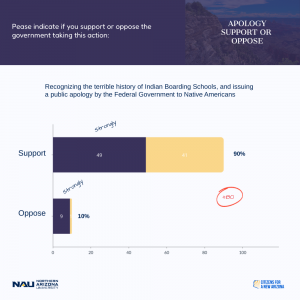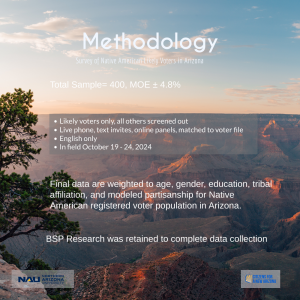NAU’s Dr. Richard Young Faculty Fellow releases data from survey of Native American likely voters in Arizona
FLAGSTAFF, AZ – Survey results of a pre-election poll of Native American likely voters in Arizona show strong support for President Biden’s historic apology. This survey was funded by Northern Arizona University’s Dr. Richard Young Endowment and the non-partisan political action committee, Citizens for a New Arizona. This marks one of the only known pre-election surveys of the Native American community in this election cycle.
According to the Associated Press, President Joe Biden is traveling to Arizona to formally apologize for the country’s role in forcing Indigenous children into boarding schools where many were physically, emotionally and sexually abused. This American policy lasted for over 150 years, and more than 950 children died as a result.
Survey results show that Native American likely voters in Arizona strongly support the Biden-Harris administration apologizing for the terrible history of Indian Boarding Schools, with forty-nine percent saying they strongly support and forty-one percent saying they support.  This is a net +80 point difference between those who say they do not support such action.
This is a net +80 point difference between those who say they do not support such action.
The National Native American Board School Healing Coalition, a non-profit incorporated under the laws of the Navajo Nation to develop and implement a national strategy that increases public awareness and healing of the trauma caused by American boarding schools, reports that “between 1869 and the 1960s, hundreds of thousands of Native American children were removed from their homes and families and placed in boarding schools operated by the federal government and the churches”.
The survey also asks respondents if they would view the Biden-Harris administration more or less favorable if the administration traveled to Indian country in Arizona to acknowledge this terrible history, with results showing a net positive forty-seven point favorability towards Biden-Harris for their actions; fifty-nine percent who said much more or somewhat more favorable to twelve percent who would see the administration less favorably.About one third, twenty-nine percent, said it would have no impact.
It is long past that we not only recognize, but take steps to hold ourselves accountable for our actions”, says Stephen Nuño-Perez, Faculty Fellow of the Dr. Richard Young endowment. “At the same time that we are recognizing past atrocities, we should take pause to reflect that even today there is a concerted effort by other leaders in our political system to target communities with mass deportation. This rhetoric is a direct descendant of this horrible past.”
“When I started this organization, I wanted to focus on moving Arizona forward towards a more democratic society that took the values of our country seriously”, said Ms. Karan English, the second woman to be elected to Congress in Arizona’s history. “I care deeply about preserving the beauty of our state, but we also need to do the hard work of raising awareness of some parts about ourselves that may be uncomfortable for us as a nation to have conversations about.”
Ms. English is a former Congresswoman, the second woman elected to Congress in Arizona’s history. She was appointed to the Office of Congressional Ethics in Washington, D.C. in 2008, where she served honorably for 14 years.
Please click below for more about the survey
About the Survey Accordion Closed
Methodology
The survey fielded from October 19 until October 24th. BSP Research was retained to conduct the survey. Respondents were selected randomly and screened to achieve a representative sample. While the survey did not model Native Americans who lived on reservations, it did ask respondents to self-report if they lived on or near a reservation. The project collected 400 completed surveys and weighted responses to age, gender, education, tribal affiliation, and modeled partisanship for the Native American registered voter population in Arizona. Surveys were conducted via digital, text, phone, and online panels, and matched to voter files. The margin of error for the sample is ±4.9 %.
